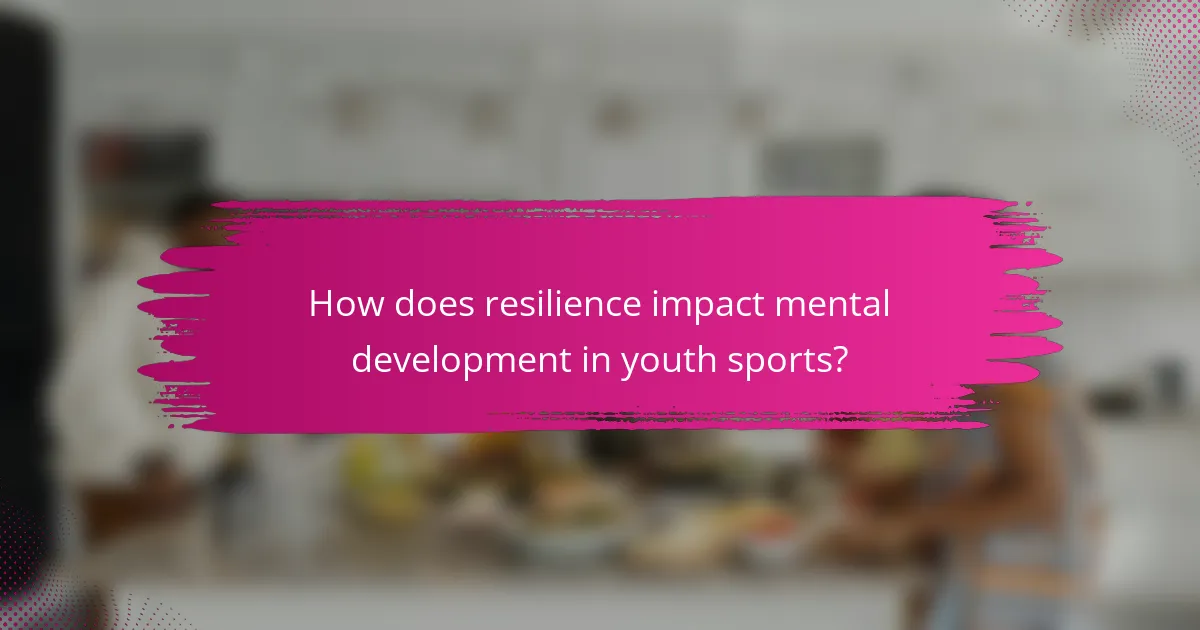Building resilience and confidence in youth sports is essential for managing stress and enhancing performance. Young athletes face challenges like performance pressure and fear of failure. Trusting oneself fosters mental adaptability and emotional regulation, crucial for overcoming these obstacles. A supportive environment and positive self-talk further strengthen resilience and encourage growth.

How does resilience impact mental development in youth sports?
Resilience significantly enhances mental development in youth sports by fostering confidence and stress management. It helps young athletes cope with challenges, leading to improved performance and emotional well-being. Research indicates that resilient athletes exhibit better focus and perseverance, essential traits for success in competitive environments. Moreover, resilience cultivates a growth mindset, encouraging youth to view setbacks as learning opportunities, thereby enhancing their overall development.
What are the key components of resilience in young athletes?
The key components of resilience in young athletes include self-belief, adaptability, and emotional regulation. Trusting oneself fosters confidence, which is crucial for overcoming challenges. Adaptability allows athletes to adjust to changing situations, while emotional regulation helps manage stress effectively. These attributes collectively enhance performance and well-being in competitive environments.
Why is building confidence essential for managing stress?
Building confidence is essential for managing stress because it empowers individuals to face challenges with a positive mindset. When youth athletes trust themselves, they develop resilience, which helps mitigate anxiety during competitions. Confidence enhances performance by allowing athletes to focus on their skills rather than their fears. Moreover, studies show that confident individuals are more likely to engage in problem-solving, reducing stress levels effectively. Overall, fostering self-trust in youth sports cultivates a supportive environment that promotes mental well-being and stress management.
What role do coaches play in fostering confidence?
Coaches play a crucial role in fostering confidence by creating a supportive environment. They provide constructive feedback, emphasize effort over outcome, and encourage goal-setting. This approach helps athletes develop resilience, enhancing their ability to manage stress. Coaches also model positive self-talk, reinforcing a growth mindset. By building trust and open communication, they empower young athletes to believe in their abilities.
How can parents support their child’s confidence-building efforts?
Parents can support their child’s confidence-building efforts by fostering a positive environment and encouraging resilience. Establish open communication to discuss feelings about sports and stress. Set realistic expectations to avoid unnecessary pressure. Celebrate effort and progress, not just outcomes, to build a growth mindset. Encourage participation in team activities to develop social skills and a sense of belonging. Provide constructive feedback that focuses on improvement and learning. Lastly, model confidence and resilience in your own challenges to inspire your child.

What universal stressors do young athletes face?
Young athletes face stressors like performance pressure, fear of failure, and balancing sports with academics. These challenges can undermine resilience and confidence. Building mental toughness is essential for managing these stressors effectively. Research shows that athletes who trust themselves and develop coping strategies perform better under pressure.
How do competition and performance expectations contribute to stress?
Competition and performance expectations can significantly increase stress in youth sports. High expectations create pressure to succeed, leading to anxiety and self-doubt. When young athletes feel they must constantly compete against peers, it can diminish their enjoyment of the sport. This stress impacts their overall performance and well-being. Building resilience and confidence helps mitigate these effects, allowing athletes to manage stress more effectively.
What common coping strategies can help alleviate stress?
Trusting oneself is essential for managing stress in youth sports. Common coping strategies include developing a routine, practicing mindfulness, and fostering supportive relationships. These methods enhance resilience and confidence, enabling young athletes to tackle stress effectively. Regular physical activity, such as team sports, can also serve as a natural stress reliever. Engaging in open communication about feelings helps build trust and reduces anxiety.

What unique challenges do youth athletes encounter in mental development?
Youth athletes face unique challenges in mental development that can hinder resilience and confidence. These challenges include performance pressure, social comparison, and fear of failure. Performance pressure often stems from high expectations from coaches and parents, leading to anxiety. Social comparison can diminish self-esteem as athletes evaluate themselves against peers. Fear of failure may cause avoidance of challenges, stunting growth. Building resilience involves fostering a supportive environment that encourages risk-taking and learning from mistakes. Developing confidence is key to managing stress and enhancing overall performance in youth sports.
How does the pressure to succeed differ among sports?
The pressure to succeed varies significantly across sports due to differing cultural expectations, competition levels, and athlete age groups. In individual sports like gymnastics, young athletes often face intense scrutiny, leading to heightened stress. Conversely, team sports like football may foster a more supportive environment, emphasizing collective achievement over individual performance. This distinction highlights the unique pressures athletes experience, impacting their resilience and confidence. Strategies to manage this stress can help youth athletes thrive, promoting a healthier sports experience.
What specific mental health issues are prevalent in youth sports?
Youth sports often see prevalent mental health issues including anxiety, depression, and burnout. These challenges can stem from performance pressure, parental expectations, and social dynamics. For instance, a study found that nearly 30% of young athletes experience anxiety related to competition. Building resilience and confidence is crucial for managing these stressors effectively.

What rare attributes contribute to exceptional resilience in young athletes?
Trusting oneself is crucial for exceptional resilience in young athletes. Rare attributes contributing to this resilience include mental adaptability, emotional regulation, and a strong support system. Mental adaptability allows athletes to adjust strategies during competition, enhancing performance under pressure. Emotional regulation helps manage stress and anxiety, fostering a positive mindset. A strong support system, including coaches and peers, provides encouragement and constructive feedback, reinforcing confidence. These attributes create a foundation for resilience, enabling young athletes to thrive in challenging environments.
How can a growth mindset enhance resilience and stress management?
A growth mindset enhances resilience and stress management by fostering self-belief and adaptability. This mindset encourages youth athletes to view challenges as opportunities for growth, leading to improved coping strategies. Research shows that individuals with a growth mindset are more likely to persist in the face of setbacks, which builds resilience. As a result, they develop stronger stress management techniques, allowing them to perform better under pressure. Embracing this mindset not only boosts confidence but also equips young athletes with the tools to navigate the demands of competitive sports effectively.
What are the benefits of mentorship in youth sports?
Mentorship in youth sports significantly enhances resilience and confidence, helping young athletes manage stress effectively. Mentors provide guidance, support, and a safe space for athletes to express their concerns. This relationship fosters trust, enabling youth to overcome challenges and setbacks. Research indicates that athletes with mentors report higher levels of self-esteem and lower anxiety, which are crucial for performance. Additionally, mentorship cultivates essential life skills, such as communication and teamwork, further contributing to personal development in sports and beyond.
How can peer support networks strengthen resilience?
Peer support networks enhance resilience by fostering trust, promoting shared experiences, and providing emotional backing. These networks create a safe environment where youth can express challenges and develop coping strategies. Research indicates that youth involved in peer support demonstrate improved confidence and lower stress levels. By connecting with peers who understand their experiences, young athletes build a sense of belonging, which is a unique attribute that strengthens their resilience. This supportive dynamic encourages personal growth and helps youth manage the pressures of sports effectively.

What practical strategies can youth athletes use to build resilience?
Youth athletes can build resilience by trusting themselves and developing confidence. They should practice positive self-talk, set achievable goals, and learn to embrace challenges. Additionally, seeking support from coaches and peers fosters a supportive environment that enhances resilience. Regular reflection on experiences helps athletes identify strengths and areas for growth, reinforcing their confidence.
What are the best practices for developing mental toughness?
To develop mental toughness, focus on building resilience and confidence in youth sports. Encourage self-trust through positive reinforcement. Set achievable goals to foster a growth mindset. Teach stress management techniques, such as mindfulness and visualization. Promote a supportive environment that emphasizes effort over outcome. Regularly engage in reflection to learn from experiences.
How can visualization techniques aid in stress management?
Visualization techniques significantly aid in stress management by enhancing focus and reducing anxiety. These techniques enable athletes to mentally rehearse performance scenarios, fostering confidence and resilience. Research shows that visualization can lower cortisol levels, promoting a calmer state. By imagining successful outcomes, young athletes build a positive mindset, which directly impacts their performance under pressure.
What common mistakes should young athletes avoid in their mental approach?
Young athletes should avoid overthinking, comparing themselves to others, neglecting mental preparation, and ignoring feedback. These mistakes can undermine resilience and confidence.
Overthinking leads to stress, causing athletes to second-guess their abilities. Comparing oneself to peers can diminish self-esteem and create unnecessary pressure. Neglecting mental preparation often results in a lack of focus during competitions. Ignoring feedback prevents growth and development, hindering performance improvement.
By recognizing and avoiding these pitfalls, young athletes can build a strong mental approach, enhancing their overall performance in sports.
What expert insights can guide parents in supporting their child’s mental development?
Trusting oneself is vital for parents to support their child’s mental development in youth sports. Building resilience and confidence helps children manage stress effectively. Parents should encourage open communication, allowing children to express their feelings and concerns.
Fostering a growth mindset is essential; children should learn that mistakes are opportunities for growth. Emphasizing effort over outcome helps them develop resilience.
Setting realistic expectations is crucial. Parents should recognize their child’s unique abilities and provide appropriate challenges. This approach nurtures confidence and reduces performance anxiety.
Additionally, parents can model healthy coping strategies. Demonstrating how to handle stress positively influences children’s responses to challenges in sports and life.


